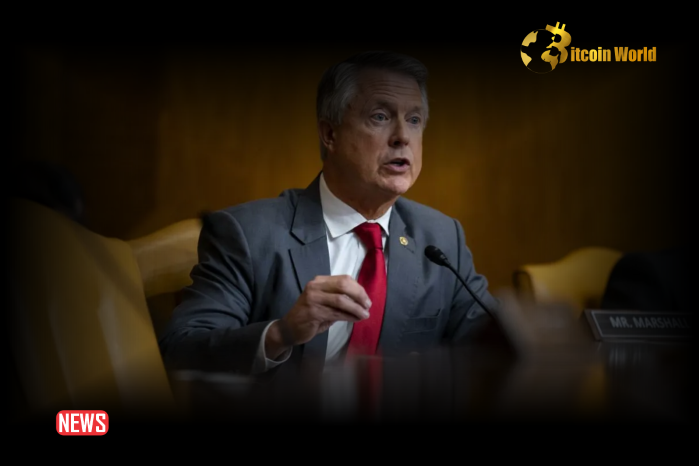In a surprising turn of events that has sent ripples through the cryptocurrency world, Republican Senator Roger Marshall has pulled back his support for the Digital Asset Anti-Money Laundering Act (DAAMLA). This controversial anti-crypto bill, which he co-authored with Democrat Senator Elizabeth Warren, has now lost a key advocate. Let’s dive into what this means for the future of crypto regulation in the US.
Why Did Senator Marshall Back Out of the Anti-Crypto Bill?
Senator Marshall’s withdrawal, officially announced on July 24th, leaves DAAMLA with only 18 remaining supporters in the Senate, according to the Congressional directory. This is a significant blow to the bill, which has been a hot topic of debate since its introduction in December 2022.

While the exact reasons for Senator Marshall’s change of heart remain unclear, it’s evident that the DAAMLA bill has faced mounting pressure from various corners. To understand the context, let’s break down what DAAMLA aimed to achieve and why it sparked such intense opposition.
DAAMLA: Bridging Crypto with Anti-Money Laundering Frameworks
Senator Elizabeth Warren, a staunch critic of the crypto industry, has long voiced concerns about the potential misuse of digital assets. She argued that cryptocurrencies are exploited by “rogue nations, oligarchs, drug lords, and human traffickers” to launder illicit funds. DAAMLA was designed to address these concerns by integrating the crypto industry into existing Anti-Money Laundering (AML) and counter-terrorism financing frameworks.
The bill proposed categorizing various crypto entities – including decentralized wallet providers, validators, and miners – as financial institutions. This classification would subject them to the stringent regulations of the Bank Secrecy Act, a move that has been met with considerable resistance from the crypto community.
The reintroduction of DAAMLA in July 2023 only amplified the existing controversy, pushing the debate further into the spotlight.
Why is the Crypto Industry Up in Arms Against DAAMLA?
Crypto advocates argue that DAAMLA paints an inaccurate picture of the industry, overstating the role of digital assets in illegal activities. They contend that the legislation poses a significant threat to the burgeoning US crypto sector, potentially stifling innovation and driving businesses overseas.
The Chamber of Digital Commerce (CDC), a leading crypto advocacy group in the US, has been a vocal opponent of DAAMLA. They have urged the Senate Banking Committee to reject the bill, warning of dire consequences for the American crypto landscape.
According to the CDC, passing DAAMLA could “erase hundreds of billions of dollars in value for U.S. startups” and devastate the investments of ordinary Americans who are legally invested in cryptocurrencies. This economic impact is a major point of contention for those opposing the bill.
Beyond economic concerns, a coalition of 80 former U.S. military and national security officials also raised alarms. In a letter dated February 13, they cautioned lawmakers that DAAMLA might backfire, inadvertently hindering law enforcement and increasing national security risks by pushing the digital asset industry out of the US. This perspective highlights the unintended consequences that overly restrictive regulation could have.
Elizabeth Warren Remains Firm Amidst Opposition
Despite the growing opposition and Senator Marshall’s withdrawal, Senator Warren remains a staunch champion of DAAMLA. With her reelection campaign for 2024 underway, she continues to advocate for stricter crypto regulations.
However, her stance has drawn a direct challenge. Pro-crypto lawyer John Deaton has announced his Republican candidacy, explicitly aiming to unseat Warren. This sets the stage for a potentially high-stakes political battle where cryptocurrency regulation will likely be a central issue.
Broader Regulatory Pushback: States Challenge SEC’s Crypto Stance
The opposition to DAAMLA is not happening in isolation. A coalition of seven U.S. states is actively challenging the Securities and Exchange Commission’s (SEC) approach to cryptocurrency regulation. This signifies a wider pushback against what is perceived as regulatory overreach in the crypto space.
Led by Iowa Attorney General Brenna Bird, these states have filed an amicus brief arguing that the SEC’s attempt to regulate cryptocurrencies is a “power grab” that will stifle innovation, harm the crypto industry, and exceed the agency’s legal authority. The coalition includes Arkansas, Indiana, Kansas, Montana, Nebraska, and most recently, Oklahoma.
Adding to the narrative of regulatory tension, SEC Commissioner Hester Peirce, known for her crypto-friendly views, stated earlier this year that the agency is operating in an “enforcement-only mode” when it comes to crypto regulation. She acknowledged the significant burden this places on industry participants, who are constantly navigating a landscape of uncertainty and potential legal battles.
“If we had clearer rules, you could focus on building,” Peirce aptly pointed out, highlighting the industry’s need for regulatory clarity rather than just enforcement actions.
Interestingly, just last week, the SEC concluded its three-year investigation into Hiro Systems without taking action. This followed a similar closure of a case involving stablecoin issuer Paxos. These instances suggest a potential shift, or at least a moment of pause, in the SEC’s enforcement approach, even amidst the broader regulatory debates.
What Does Marshall’s Withdrawal Signal for Crypto Regulation?
Senator Roger Marshall’s withdrawal from DAAMLA co-sponsorship is a noteworthy event. It signifies a potential weakening of bipartisan support for stringent anti-crypto legislation and could be a bellwether for a shift in the broader regulatory landscape. While Elizabeth Warren remains a strong voice for stricter controls, the growing opposition from within the political sphere, the crypto industry, and even national security experts suggests that a more balanced and nuanced approach to crypto regulation might be emerging.
The coming months will be crucial in observing how this development unfolds and whether it truly marks a turning point in the ongoing debate about cryptocurrency regulation in the United States.
Disclaimer: The information provided is not trading advice, Bitcoinworld.co.in holds no liability for any investments made based on the information provided on this page. We strongly recommend independent research and/or consultation with a qualified professional before making any investment decisions.


